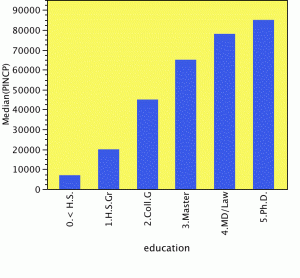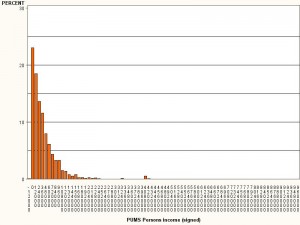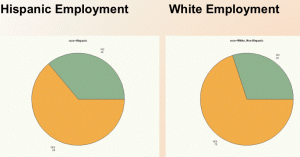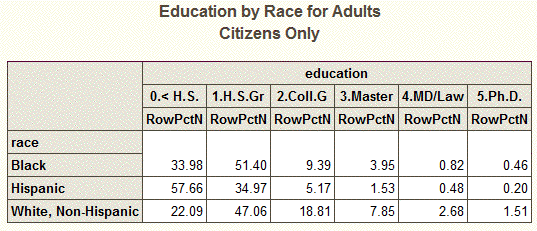Race, Income and Education – AnnMaria Explains it All
If you are the right age to have watched re-runs of the show on Nickelodeon, Clarissa Explains It All, then you are the age group today’s blog was written for. And don’t tell me the previous statement is grammatically incorrect. After having looked at these results, I’m already pissed off (note to self: don’t swear in front of children)
Look at this next graph closely. It can answer several questions for you, including does education matter (yes, to an extent) and does it overcome the effects of race (some, but not completely).
Notice those lines I drew on the chart. What they show is an effect of completion of education. For every group, there is an increase in mean income at the point where you get diploma or degree. There is a slight bump up when you finish high school, another jump when you finish a college degree, and the biggest jump when you finish a graduate degree, either an MD/ JD or Ph.D. You can’t really see it on the chart (which is why you want to look at the tables as well) but each point you FINISH something there is a big jump. So, for example, going from three years of college to a college degree is a much bigger increase in salary than going from no college to one year of college.
Why the drop down at the end? That is because people who have an MD or a law degree on the average made a little more than people with Ph.D.. Both groups, though, made a lot more money than people with just a college degree.
So, first lesson, if you want to make a lot of money in America, your best chance is to go to college for at least 8 years. Remember that whole thing about mean and median, though? Here is the MEDIAN income by education.
 It looks like the mean for those doctors and lawyers is pulled off by some very wealthy people. As far as median income, people who get a lot more education made a lot more money.
It looks like the mean for those doctors and lawyers is pulled off by some very wealthy people. As far as median income, people who get a lot more education made a lot more money.
So, is it true that if you just worked hard and got an education you’d be successful? To a point, yes. But that means you have to graduate from high school, be able to afford to go to college, graduate from college with good enough grades to get into graduate school, be able to afford to go to graduate school and graduate with an MD or a PhD.
Anyone can do that – there’s certainly no law against anyone applying, and it’s against the law to just say, “Hey, we don’t accept black people in medical school”, unlike, say, when my grandfather went to medical school in the 1920s.
HOWEVER …. if your parents have money, it is a whole lot easier for you to afford college and to afford not to work during college. If you don’t have to work full-time and can just study, if you don’t have to wait until three weeks into the semester when you’ve earned enough money to buy your books, then it is going to be easier for you to get good grades, get into college and stay in college. If your parents went to college themselves, they are going to be better able to help you with everything from your schoolwork in high school to filling out your college applications.
 I am NOT saying this to discourage anyone, in fact, the opposite. I am saying it because when you are in one of those accelerated high school programs or when you are in college, and it seems like making the grades is easier for other people than for you, you are right. If you find yourself asking what’s wrong with you, the answer is – there’s not a god damn thing wrong with you (note to self: Don’t swear in front of the children).
I am NOT saying this to discourage anyone, in fact, the opposite. I am saying it because when you are in one of those accelerated high school programs or when you are in college, and it seems like making the grades is easier for other people than for you, you are right. If you find yourself asking what’s wrong with you, the answer is – there’s not a god damn thing wrong with you (note to self: Don’t swear in front of the children).
We just saw that with every diploma or degree you get, your likely income goes up A LOT, even with the fact that income is very skewed.
Now, here is another chart from the census data. This one bothers me even more than the others.
In 2009, over half of the Hispanic adults in California had not graduated from high school. This compares to about 20% of the white, non-Hispanic population. The exact figures are 59% and 22%.
Does this mean that fewer people are working? Well, it is true that there is much higher unemployment among people with less education. However, it is not nearly enough to explain the differences in income.
64% of Hispanics are employed, compared to 70% of non-Hispanic whites. That’s a difference but it’s not nearly enough to explain the difference in the chart we saw yesterday which showed that whites have a median income more than DOUBLE that of Hispanics.
So, we see that most Hispanics are working, in fact, the percentage of Hispanics working are just a little below the average for the state of California, which is 67%. Those numbers, by the way, only include people who are working full-time. What happened to that thing about people are poor because they’re lazy and not working hard?
Could it be that those Hispanics who have less than a high school education are all illegal immigrants? That’s the term we kept hearing during the last election, right? The reason our state is having problems is because of all of those people here illegally.
Well, I ran those statistics just on citizens. Before I ran the analyses, before I looked at the results, I had to think about this. I’m Latina. What if it turns out that is the truth? What if the data show that the real problem is we have all of these non-citizens here and they are bringing down our average educational level, our median income, everything … What would you do?
A very wise man told me once,
“The data show what they show.”
I found some mistakes in a study he had done, and he was pretty well-known for his research, and I was just nobody. When I showed him what I had found, he helped me write up my study and get it published. His point was that if you are a real scientist, you have to do the best you can to find the truth and then you state that truth as simply as you can, whether it turns out to be what you hoped to find or not. Just so you know, NOT all scientists are like that, but they should be.
Here’s what I found:
It turns out that if you only include citizens, it makes very little difference. The reason we have income inequality in this country is NOT because we have a whole lot of undocumented people from Mexico. I always suspected that was bullshit (note to self: remember not to swear in front of the children). In fact, including only citizens decreases only down to 57% the percentage of people without a high school education.
So, why did I come to tell you all of this depressing stuff? For one reason, the truth is always better than a lie. If you KNOW that the chances are you won’t make much money, even if you work full time and even if you are a citizen, unless you get an education, then you damn well better get one.
High school is FREE! If you absolutely hate the high school you have to attend, see if you can get into a charter school, a magnet school, a scholarship to a private school – they DO give them. If none of that works and you drop out even though I TOLD you not to get your GED or go to an alternative school.
You can even go to a community college without a high school diploma. Please don’t waste tens of thousands of dollars going to some place like the University of Phoenix. You can go to Los Angeles City College or Santa Monica College for about $600 a semester in fees and if your family doesn’t have a lot of money you can get usually get the tuition waived.
When you get that education, not only will you be making more money but you will be in a position to do something about the way income is distributed in this country.

— unless you’re okay with it being like this?
First you understand the way it is – and then you change it. There was a time when no one could imagine there being a black president. There was a time when universities turned down women, African-Americans, Jews, Asian-Americans for medical school just because they weren’t white and male. It isn’t that way any more.
In fact, over the past thirty years, income has changed to be less equal in America. It can change back.
You don’t have to accept the world being the way it is.




This is really insightful stuff. Paul Krugman does a great job explaining the link between racism in this country and income inequality in his book Conscience of a Liberal, but it’s about making political change, rather than addressing people at an individual level. Your post here is some of the first work I’ve seen trying to explain it to folks that are affected at an individual level, and offering some practical suggestions on how to try to even the playing field for oneself, insofar as that is possible. Both perspectives will be necessary to get things to improve.
(And don’t get me started on the f***ers who ask, apparently seriously, “But why is income inequality even a problem?”)
I remember being the TA for an undergrad course in compilers at NMSU. Nearly every student in that course needed a job while they were getting their undergraduate degrees in comp sci at NMSU. I felt for these guys who have to compete with the far more privileged students who go to Ivy League Universities in the US. I felt that I had it a lot easier during my undergraduate years in India where I did not have to worry about paying for my education.
Thanks, Joe. I’ll let you know how the students like it tomorrow.
Sudarshan – I know what you mean about having it easier. I had to work full-time through my undergraduate degree and MBA and most of my friends worked part-time if at all. I was also competing in two sports, one at the international level and one in varsity. When I got my Ph.D., my husband had a good job, so even though we had three babies we had a housekeeper and I could work as a research assistant on campus. It was a HUGE advantage compared to my friends who had to work at all kinds of unrelated jobs. Of course, I got more research articles published because I could work part-time on campus and work on my research the rest of the time. So, yeah, I’ve been on the harder end and the easier end.
I think having a job during your undergrad is actually beneficial to finding employment in your career field when you graduate. It tells the employer that you have a work ethic and that you have time management skills. It also provides great field experience if you get an internship.
While not officially considered a minority, I did have to pay my own way through college as my family couldn’t afford to help me out any. Neither of them went to college, largely because their parents couldn’t afford it either. While my mom came from a normal middle class white family, my dad is the son of an Italian who came here to start a restaurant. My family experienced a lot of prejudice, especially from a group of people who who fought to make it illegal for my grandpa to add a bar to his restaurant, and this was in the 60’s! I basically made a gamble that when I graduated I wold land a well enough paying job to pay for the mountain of student load debt I put myself in. Good thing it worked because I really didn’t have much for a plan B!